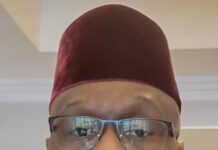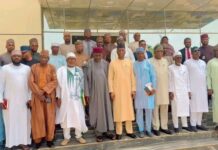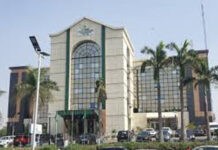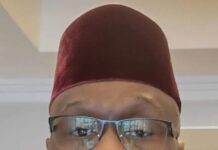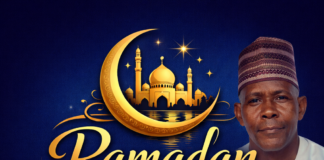By Imam Murtadha Gusau
In the Name of Allah, the Most Gracious, the Most Merciful
All praise is due to Allah, Lord of all creation. May Allah extol the mention of the Prophet in the highest company of Angels and may the peace and blessings of Allah be upon him, his family, his Companions and all those who follow him exactly till the Day of Judgement.
Respected brothers and sisters, undoubtedly, no one can be more truthful and honest than the Prophets and Messengers of Allah. Prophet Muhammad (Peace be upon him) proved by his living example that he was the most truthful and honest person of his age. Everyone was impressed by his honesty and truthfulness. He was a poor orphan, who had started trading with his uncle, but in a very short time, owing to his honest and fair dealings with all people, he became well-known and respected. He was known as Al-Sadiq (the Truthful) and Al-Amin (the Faithful). Every Makkan, rich or poor called him by these names. When the dispute arose, among the various tribes of Makkah, as to who should lay the Black Stone in its proper place, in the Ka’abah, they decided that the one who entered the Ka’abah first next morning would place it. Prophet Muhammad (Peace be upon him) was the first to enter the Ka’abah that morning and when the people saw him they were all very happy that Al-Amin and Al-Sadiq had come and would be the one to lay the Black Stone in its proper position.
Once the chiefs of the Quraish were sitting and talking about him. An-Nadhr Bin Al-Harith, the most experienced of them all, said:
“O Quraish! You have not been able to find any plan to meet the calamity that has fallen upon you. Muhammad (Peace be upon him) grew up from childhood in your presence. He was the most liked, honest and faithful among you. Now when he has grown to maturity and has presented these things to you, you say, he is a magician, a soothsayer, a poet, a mad man. By Allah! I have heard his Message, he is none of these things. A new calamity has fallen upon you.”
When he gathered together all the Quraish near the Mount of Safa and asked them:
“O Quraish! If I say that an army is advancing on you from behind the mountains, will you believe me?” All said in one voice, “Yes; because we have never heard you telling a lie.”
All the people of Makkah, without any exception swore to his truthfulness and honesty, for he had lived an unblemished and extremely pious life among them for forty years.
He had lived his whole life in purity and virtue among them and this was acknowledged even by his most staunch enemies. They knew that he was the most honest and truthful person among them. The Glorious Qur’an therefore appealed to them to look at his life and try to understand. How could he tell lies against Allah, when he did not tell lies against human beings! When the Qaisar (Caesar) of Rome received a letter from the Prophet Muhammad (Peace be upon him) inviting him and his followers to Islam, he called the Arab traders who were then visiting his country. He asked Abu Sufyan, their leader:
“Did you ever find Muhammad telling a lie before his claim to Prophethood?” He replied that he had not. Then the Qaisar (Caesar). said, “I asked you if he had ever told a lie and you replied that he had not. I am sure, if he had spoken unjustly against Allah, he would not have abstained from speaking falsely against human-beings.”
The Qaisar then questioned him about the Prophet’s general behaviour and conduct with people. Abu Sufyan replied:
“Muhammad is nobly born; is honest and truthful, and has never broken a pledge. He enjoins his followers to worship none but One Allah and to pray to Him alone. He preaches kindness, piety and tolerance towards all and his followers are on the increase.”
Prophet Muhammad (Peace be upon him) practiced honesty in his life and preached honesty and truthfulness to others. Abu Sa’id Al-Khudri (may Allah be pleased with him) reported Allah’s Messenger (Peace be upon him) as saying:
“Let not respect for men prevent any of you from speaking the Truth when he knows it.”
Dear brothers and sisters, the greatest, most profound change in history happened peacefully.
Nevertheless, it was truly decisive.
Our beloved Prophet Muhammad (Peace be upon him) changed the world by changing people’s beliefs, their behaviour, their customs, and their social norms, and he did so by convincing them with kindness and gentle persuasion. He did not force people to agree with him. He did not resort to a show of strength except when absolutely necessary to protect his people.
For the first thirteen years of his mission, he lived in Makkah in a state of abject weakness, persecuted by his countrymen. After he emigrated to Madinah, his focus was on building and safeguarding his community. If we consider the landmark events of the Madinah era, we find that the battle of Badr was not pre-planned; the battle of Uhud was purely defensive as was the Battle of the Confederate tribes (Ahzab).
The peace treaty of Hudaibiyah that the Prophet Muhammad entered into with the Makkans was seen by many of the Muslims to be a humiliation for Islam, but the Prophet knew better. Then, when the Muslims finally entered Makkah in victory, they did so peacefully. They took the city without fighting or bloodshed. Then the Prophet (Peace be upon him) stood among the Makkans, who feared reprisals for the years of persecution they had meted out to the Muslims, and he said:
“You may go as you please, for you are free.” (Authenticated by Sheikh Al-Albani)
He restored to the weak and granted their rights, manumitted slaves, elevated the status of the people, and did away with oppressive practices against women and children. He likewise did away with the exploitative practices, pomp and influence of the city’s despots with the minimum of hardship for all parties concerned.
It is impressive how the Prophet Muhammad (Peace be upon him) rid Arabian society of the many deep-rooted and pernicious customs that they had during the times of ignorance (Jahiliyyah). He was able to bring about a new mindset, freed from the rote, blind following of ancestral traditions. He made the people aware of the falsehood of their former customs, so this awareness could protect them from lapsing back into such modes of thought.
In this way, the Prophet Muhammad (Peace be upon him) brought them out of the darkness of superstition, fortune-telling and divination. He dispelled their wantonness and sexual exploitation. He did away with their tribal boasting and rivalries. He rid their hearts of racism. When his own companion Abu Dharr betrayed racist tendencies, he did not hesitate to tell him:
“You are indeed a man possessed of some habits from the times of ignorance (Jahiliyyah).” [Sahih Muslim]
He never compromised on polytheism. He opposed it absolutely, regardless of the sacrifices and hardships this meant for him. He stove to dismantle polytheism in the minds and hearts of the people and bring them to monotheism. Nevertheless, when he went to Makkah after the Treaty of Hudaibiyah to perform the Umrah (minor pilgrimage), there were three hundred and sixty idols around the Ka’abah. He did not destroy the idols or interfere with them in any way.
What would have been the point?
Because it is easy for people to recreate their idols as long as they believe in them. The only permanent way to dismantle them is to dismantle them in the people’s hearts and minds. Only after he entered Makkah as their leader, after the people entered into Islam in droves, did he remove the idols from the Ka’abah, restoring it as a place of worship for Allah alone. At this time, a great majority of the people had been convinced of the falsehood of idol worship. Indeed, one of the Makkan leaders commented:
“Had they been of any worth, they would not have forsaken us.”
The Prophet Muhammad (Peace be upon him) was an example of patience in how he coexisted with the pagans in Makkah, and in the fortitude he showed by responding gently and with an open heart to them, in spite of their abuses and hostility towards him and towards the men and women who chose to follow him.
Then, after the emigration to Madinah, he lived alongside the Jews and the pagans from the local tribes, not to mention the hypocrites who concealed their animosity towards Islam and the Muslims who were weak in faith. These people were still in Madinah at the time of the Prophet’s death. The chapter of the Qur’an entitled al-Hujurat, which addresses those who were being ill-mannered towards the Prophet and using spiteful names, was revealed in the ninth year after the emigration. One of its final verses reads:
“The Bedouins say: “We have believed.” Say [to them]: “You have not [yet] believed; but say [instead], ‘We have submitted’, for faith has not yet entered your hearts. And if you obey Allah and His Messenger, He will not deprive you from your deeds of anything. Indeed, Allah is Forgiving and Merciful.” [Qur’an, 49: 14]
At the time of the Prophet Muhammad’s death, his shield was being held by a Jewish man as collateral for a debt he owed him. The Prophet (Peace be upon him) had borrowed the money to provide food for his family. The Prophet needed the money at the time, and the purchase of the shield was in the Jewish man’s interest at the time.
This is the basis of coexistence, to realise that your own welfare and that of other people can be realised together. In this way, the Prophet gave a practical lesson for future generations. Madinah, the first capital of Islam, had this diversity within it. In this way, the people could learn how to call others to Islam and how to conduct themselves in a society where they live with people of other faiths as fellow citizens.
During the many eras of Islamic rule throughout history, the rights of the various religious communities and denominations were upheld and protected within the context of a strong social fabric. They were not forced to change their religion or their denominational affiliation.
The Muslims continued to engage them in polite debate and discussion. This social fabric can be torn apart by conflicts spurred on by political interests who instigate the ignorant people and play on their prejudices. When this happens, when neighbour turns against neighbour, people abandon our beloved Prophet Muhammad’s teachings which stress neighbourly rights even with those you disagree with.
At times of conflict, people behave irrationally and suspiciously. Sensible people know that this state of affairs is temporary and can – must – be surmounted. People can settle back into living together in peace and cooperation for their mutual wellbeing. This is why Amr Ibn al-As praised the Roman people for being:
“The quickest people to recover from a crisis.”
He was referring to an aspect of their cultural mindset that allowed them to get past the times of strife and war and return to a productive state of dialogue and cooperation. This is what we see in Europe after the two world wars. The European people pulled themselves together and ultimately created the European common market, and ultimately the European Union (EU) with all of its impressive institutions.
By contrast, we find some Muslims and Arab tribes today, holding on to their ancient feuds, passing the animosity down from one generation to the next, keeping them alive through their legends and poems as if the conflict began only yesterday. These tensions can sometimes take on a sectarian or partisan character, spurred on by political rhetoric and ideology.
We see this among both Islamic and secular factions, which shows that the particular ideology in the political theatre did not succeed in disciplining this trend, but instead channeled it one way or another.
All praise is due to Allah, Lord of the worlds. May the peace, blessings and salutations of Allah be upon our noble Messenger, Muhammad, and upon his family, his Companions and his true followers.
The perfect knowledge belongs to Allah the Almighty. Our last prayer is all praise is due to Allah, the Lord of the Worlds. And May the peace and blessing be upon our beloved Prophet, his Family, his Companions and his Brothers till the Day of Resurrection.
This Jumu’ah Khutbah (Friday Sermon) was prepared for delivery today Friday, Safar 5, 1441 A. H. (October 4, 2019), by Imam Murtadha Muhammad Gusau, the Chief Imam of Nagazi-Uvete Jumu’ah and the late Alhaji Abdur-Rahman Okene’s Mosques, Okene, Kogi State, Nigeria. He can be reached via: gusaumurtada@gmail.com or +2348038289761.

